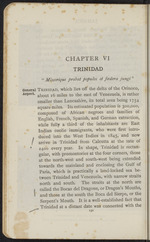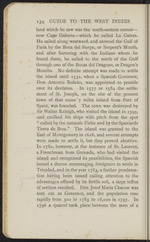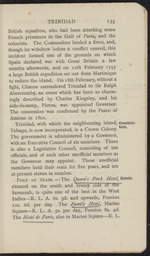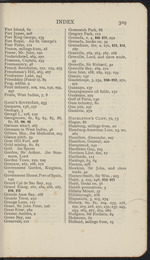| 1 |
 |
“...population is 300,000,
composed of African negroes and families of
English, French, Spanish, and German extraction,
while fully a third of the inhabitants are East
Indian coolie immigrants, who were first intro-
duced into the West Indies in 1845, and now
( arrive in Trinidad from Calcutta at the rate of
» 2400 every year. In shape, Trinidad is rectan-
gular, with promontories at the four corners, those
at the north-west and south-west being extended
towards the mainland and enclosing the Gulf of
Paria, which is practically a land-locked sea be-
tween Trinidad and Venezuela, with narrow straits
north and south. The straits at the north are
. called the Bocas del Dragone, or Dragon’s Mouths,
I and those at the south the Boca del Sierpe, or the
Serpent’s Mouth. It is a well-established fact that
Trinidad at a distant date was connected with the
130...”
|
|
| 2 |
 |
“...134 GUIDE TO THE WEST INDIES
land which he saw was the south-eastern corner—
now Cape Galeota—which he called La Galera.
He sailed along westward, and entered the Gulf of
Paria by the Boca del Sierpe, or Serpent’s Mouth,
and after bartering with the Indians whom he
found there, he sailed to the north of the Gulf
through one of the Bocas del Dragone, or Dragon’s
Mouths. No definite attempt was made to settle
the island until 1532, when a Spanish Governor,
Don Antonio Sedeno, was appointed to preside
over its destinies. In 1577 or 1584 the settle-
ment of St. Joseph, on the site of the present
town of that name '7 miles inland from Port of
Spain, was founded. The town was destroyed by
Sir Walter Raleigh, who visited the island in 1595,
and caulked his ships with pitch from the spot
“ called by the naturals Piche and by the Spaniards
Tierra de Brea.” The island was granted to the
Earl of Montgomery in 1628, and several attempts
were made to settle it, but they proved abortive.
In 1780, however...”
|
|
| 3 |
 |
“...TRINIDAD
135
British squadron, who had been attacking some
French privateers in the Gulf of Paria, and the
colonists. The Commodore landed a force, and,
though he withdrew before a conflict ensued, this
incident formed one of the grounds on which
Spain declared war with Great Britain a few
months afterwards, and on 12th February 1797
a large British expedition set out from Martinique
to reduce the island. On 18th February, without a
fight, Chacon surrendered Trinidad to Sir Ralph
Abercromby, an event which has been so charm-
ingly described by Charles Kingsley, and his
aide-de-camp, Picton, was appointed Governor.
The concession was confirmed by the Peace of
Amiens in 1802.
Trinidad, with which the neighbouring island, Constitu-
Tobago, is now incorporated, is a Crown Colony.
The government is administered by a Governor,
with an Executive Council of six members. There
is also a Legislative Council, consisting of ten
officials, and of such other unofficial members as
the Governor may appoint...”
|
|
| 4 |
 |
“...250
Grange Lane, in
Grant, Sir John Peter, 126
Great River, 162
Greater Antilles, 2
Green Bay, 122
Green vale, in
Greenwich Park, 86
Gregory Park, in
Grenada, 2, 4,161-179,292
Grenada, books on, 54
Grenadines, the, 2, 170, 173, 174,
187
Grenville, 162, 165, 167, 168
Grenville, Lord, and slave trade,
43
Grenville, Sir Richard, 32
Grenville Bay, 162, 171
Gros Islet, 188, 189, 193, 199
Guacio, 137
Guadeloupe, 3,234, 950-959, 270,
271
Guanapo, 137
Guayaguayare oil fields, 150
Guayama, 279
Gulf of Paria, 130
Gum industry, 80
Gun pits, 197
Gustavia, 272
Hackleton’s Cliff, 72, 75
Hague, 86
Hamburg, sailings from, 20
Hamburg-American Line, 13, 20,
261
Hamilton, Alexander, 227
Hamilton, General, 220
Hampstead, 240
Hardware Gap, 123
Harrison Line, the, 17
Hartlands, in
Hastings, 63, 64
Havana, 278
Hawkins, Sir John, and slave
trade, 42
Haynes-Smith, Sir Wm., 223
Hayti, 3, 105, 248, 973-977
Hayti, books on, 56
Health precautions, 5
Hillaby Mount, 57
Hillsborough, 168
Hispaniola, 3, 105, 274
History...”
|
|
